I get a libyuv crash recently.
I try a lot, but no use.
Please help or try to give some ideas how to achieve this. Thanks!
I have a iOS project(Objective C). One of the functions is encode the video stream.
My idea is
Step 1: Start a timer(20 FPS)
Step 2: Copy and get the bitmap data
Step 3: Transfer the bitmap data to YUV I420 (libyuv)
Step 4: Encode to the h264 format (Openh264)
Step 5: Send the h264 data with RTSP
All of function run on the foreground.
It works well for 3~4hr.
BUT it always will be crashed after 4hr+.
Check the CPU(39%), Memory(140MB), it is stable(No memory leak, CPU busy, etc.).
I try a lot, but no use ( Include add try-catch in my project, detect the data size before run in this line )
I figure out it will run more if decrease the FPS time(20FPS -> 15FPS)
Does it need to add something after encode each frame?
Could someone help me or give some idea for this? Thanks!
// This function runs in a GCD timer
- (void)processSDLFrame:(NSData *)_frameData {
if (mH264EncoderPtr == NULL) {
[self initEncoder];
return;
}
int argbSize = mMapWidth * mMapHeight * 4;
NSData *frameData = [[NSData alloc] initWithData:_frameData];
if ([frameData length] == 0 || [frameData length] != argbSize) {
NSLog(@"Incorrect frame with size : %ld\n", [frameData length]);
return;
}
SFrameBSInfo info;
memset(&info, 0, sizeof (SFrameBSInfo));
SSourcePicture pic;
memset(&pic, 0, sizeof (SSourcePicture));
pic.iPicWidth = mMapWidth;
pic.iPicHeight = mMapHeight;
pic.uiTimeStamp = [[NSDate date] timeIntervalSince1970];
@try {
libyuv::ConvertToI420(
static_cast<const uint8 *>([frameData bytes]), // sample
argbSize, // sample_size
mDstY, // dst_y
mStrideY, // dst_stride_y
mDstU, // dst_u
mStrideU, // dst_stride_u
mDstV, // dst_v
mStrideV, // dst_stride_v
0, // crop_x
0, // crop_y
mMapWidth, // src_width
mMapHeight, // src_height
mMapWidth, // crop_width
mMapHeight, // crop_height
libyuv::kRotateNone, // rotation
libyuv::FOURCC_ARGB); // fourcc
} @catch (NSException *exception) {
NSLog(@"libyuv::ConvertToI420 - exception:%@", exception.reason);
return;
}
pic.iColorFormat = videoFormatI420;
pic.iStride[0] = mStrideY;
pic.iStride[1] = mStrideU;
pic.iStride[2] = mStrideV;
pic.pData[0] = mDstY;
pic.pData[1] = mDstU;
pic.pData[2] = mDstV;
if (mH264EncoderPtr == NULL) {
NSLog(@"OpenH264Manager - encoder not initialized");
return;
}
int rv = -1;
@try {
rv = mH264EncoderPtr->EncodeFrame(&pic, &info);
} @catch (NSException *exception) {
NSLog( @"NSException caught - mH264EncoderPtr->EncodeFrame" );
NSLog( @"Name: %@", exception.name);
NSLog( @"Reason: %@", exception.reason );
[self deinitEncoder];
return;
}
if (rv != cmResultSuccess) {
NSLog(@"OpenH264Manager - encode failed : %d", rv);
[self deinitEncoder];
return;
}
if (info.eFrameType == videoFrameTypeSkip) {
NSLog(@"OpenH264Manager - drop skipped frame");
return;
}
// handle buffer data
int size = 0;
int layerSize[MAX_LAYER_NUM_OF_FRAME] = { 0 };
for (int layer = 0; layer < info.iLayerNum; layer++) {
for (int i = 0; i < info.sLayerInfo[layer].iNalCount; i++) {
layerSize[layer] += info.sLayerInfo[layer].pNalLengthInByte[i];
}
size += layerSize[layer];
}
uint8 *output = (uint8 *)malloc(size);
size = 0;
for (int layer = 0; layer < info.iLayerNum; layer++) {
memcpy(output + size, info.sLayerInfo[layer].pBsBuf, layerSize[layer]);
size += layerSize[layer];
}
// alloc new buffer for streaming
NSData *newData = [NSData dataWithBytes:output length:size];
// Send the data with RTSP
sendData( newData );
// free output buffer data
free(output);
}
[Jan/08/2020 Update]
I report this ticket on the Google Issue Report
https://bugs.chromium.org/p/libyuv/issues/detail?id=853
The Googler give me a feedback.
ARGBToI420 does no allocations. Its similar to a memcpy with a source and destination and number of pixels to convert.
The most common issues with it are
1. the destination buffer has been deallocated. Try adding validation that the YUV buffer is valid. Write to the first and last byte of each layer.
This often occurs on shutdown and threads dont shut down in the order you were hoping. A mutex to guard the memory could help.
2. the destination is an odd size and the allocator did not allocate enough memory. When alllocating the UV plane, use (width + 1) / 2 for width/stride and (height + 1) / 2 for height of UV. Allocate stride * height bytes. You could also use an allocator that verifies there are no overreads or overwrites, or a sanitizer like asan / msan.
When screen casting, usually windows are a multiple of 2 pixels on Windows and Linux, but I have seen MacOS use odd pixel count.
As a test you could wrap the function with temporary buffers. Copy the ARGB to a temporary ARGB buffer.
Call ARGBToI420 to a temporary I420 buffer.
Copy the I420 result to the final I420 buffer.
That should give you a clue which buffer/function is failing.
I will try them.

